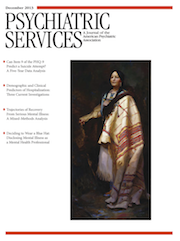Social Networks and Arrest Among Persons With Severe Mental Illness: An Exploratory Analysis
Abstract
Objective
This exploratory study examined whether social network structures among persons with severe mental illness—the size of the current friendship network and the frequency of contact with it—are related to lifetime arrest.
Methods
Data from 119 individuals who participated in psychosocial rehabilitation programs in Los Angeles County were used. Hierarchical logistic regression modeling was applied.
Results
Having frequent contact with the network was associated with a five times greater likelihood of lifetime arrest (odds ratio [OR]=4.99, 95% confidence interval [CI]=1.31–19.12), and having a larger network was associated with a 76% decrease in likelihood (OR=.24, CI=.06−.92).
Conclusions
Social network theories suggest that network structures influence attitudes and behaviors and access to resources among network members. Results indicate that friendship network structures in this population, typified by concentrated disadvantage, may be related to arrest and should be considered in future studies examining risk and protective factors for criminal justice involvement.



